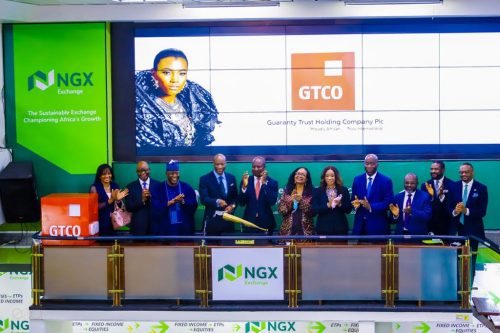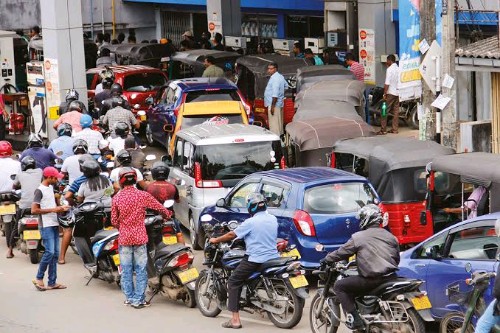Nigeria’s telecom providers, notably MTN Nigeria and Globacom, through the Nigerian Communications Commission (NCC), have requested permission from the Federal Government to increase their rates.
The move occurred after some of the operators had to report losses the previous year due to rising energy prices and foreign exchange losses.
Less than 24 hours had passed since MultiChoice, a pay television provider in South Africa, increased its pricing when the telecoms proposed to do the same. A number of businesses, such as breweries and discos, have also increased their pricing recently.
On Thursday, the telcos, under the aegis of the Association of Licensed Telecom Companies of Nigeria and the Association of Telecom Companies of Nigeria, issued a joint statement asking the government to expedite the approval.
The two bodies in their statement explained, “Despite the adverse economic headwinds, the telecommunications industry remains the only industry yet to review its general service pricing framework upward in the last 11 years, primarily due to regulatory constraints.
“For a fully liberalised and deregulated sector, the current price control mechanism, which is not aligned with economic realities, threatens the industry’s sustainability and can erode investors’ confidence.”
The associations called on the federal government to facilitate a constructive dialogue with industry stakeholders to address pricing challenges and establish a framework that balances consumers’ affordability with operators’ financial viability.
The telecom industry appears to be among a few sectors that have yet to review their prices despite the rising inflation in the country amid other economic challenges. They blamed this on the regulatory restraints that have been preventing them from pricing appropriately.
Efforts to reach the commission’s Director of Public Affairs, Reuben Mouka, on whether the request will be considered proved abortive as of press time on Thursday. There were no responses to calls, WhatsApp messages, and text messages sent to his line.
The NCC regulates prices in the telecom industry, and telecom operators are not allowed to implement any price changes without the regulator’s approval. The regulator has said a cost-based study is being conducted to determine if it would approve price increments for the operators.
The Chairman, Association of Licensed Telecoms Operators of Nigeria, Gbenga Adebayo, said in a publication on Thursday that cost reflective tariff was non-negotiable.
“We have seen the impact of price control in other segments of the economy, like power. If providers cannot operate sustainable business models, then they’ll stop investing. When that happens, the existing infrastructure starts to crumble.
“For power, a consumer can choose to take ownership of the solution by buying a generator, or a solar panel. For fuel, the government can step in as a provider of the last resort and manage a subsidy regime that mitigates the impact on the population. Those options are not available in the telecoms sector. There is no self-help solution,” he explained.
The industry has faced significant increases in operational costs occasioned by the scarcity of foreign exchange, network expansion, and upgrades, which have also negatively affected the bottom lines of the operators.
Investment in the sector has also dwindled to $134m in 2023 from $456.8m in the previous year, a decline of $322m, according to the National Bureau of Statistics.
The decline represented a decrease of approximately 70.5 percent.
MTN Nigeria Plc has disclosed a substantial loss of N740.4bn for the fiscal year 2023, a notable surge from the N81.8bn loss reported in 2022, marking an alarming 804 per cent increase, equivalent to N658.6bn.
This drastic financial setback is primarily attributed to the effects of the foreign exchange market liberalisation that commenced in June of the previous year.
MTN clarified that it applied an official exchange rate of N907.11 per dollar, based on NAFEM (Nigerian Autonomous Foreign Exchange Market), as of December 31, 2023.
This implies that the reported loss might escalate further if the prevailing exchange rate between the naira and dollar remains unchanged by the end of March, coinciding with the publication of its Q1 results.
Meanwhile, Airtel Africa reported a 99.6 per cent decline in its post-tax profit to $2m at the end of the nine months ended December 2023 from $523m at the end of the same period in 2022.
The key driver behind these losses was the liberalization of the forex market in June 2023, which led to a 96.7 per cent devaluation of the naira from N461 per dollar in December 2022 to N907.1 per dollar by the end of 2023, MTN disclosed in its audited financial results for 2023.
According to The Punch, the President of Telecommunications Companies of Nigeria, Tony Izuagbe, explained that telcos are running at a loss and may not survive this year should tariffs remain the same.
Izuagbe warned that if urgent action is not taken, many telecom operators may be forced to shut down operations, leaving millions of Nigerians without access to vital communication services.
He emphasised that the current tariff regime is insufficient to cover the costs of providing services, and urged regulatory bodies to address the industry’s challenges and support operators in maintaining the quality of service.
The current price of diesel, ranging from N1300 to N1500 per litre, has placed a substantial financial burden on operators, who consume an average of 2000 to 3000 litres per month per base station, Izuagbe analysed.
In 2023, telecommunication companies spent about N429.43bn on diesel for base stations, an increase of 34.57 per cent from the N319.11bn they spent in 2022. This is because diesel prices soared in 2022 and remained at an elevated level in 2023.
In 2022, the telecoms industry noted, “The telecommunications industry has been heavily financially impacted following Nigeria’s economic recession in 2020 and the effect of the ongoing Ukraine/Russia crisis. This has increased energy costs, (which constitutes an appreciable 35 per cent of ALTON’s members’ operating expenses).”
Telcos use an average of 40 million litres of diesel per month to power telecom sites.
ATCON President expounded, “We all know the challenges of inflation, which is affecting operators. Let’s take a typical diesel price, for example, which is sold at N1500 per litre or even N1300. On average, a typical base station would use about 2000–3000 litres in a month.”
Analysing further, he stated, “The cost per gigabyte of data in Nigeria is about N250. By the time you look at the expenses incurred in maintaining a base station, you will discover that revenue will not be enough to cover them.
“This excludes colocation and infrastructure services. By the time they mark up their charges, the operators will also be suffering.”
He revealed that many operators were already cutting back on infrastructure investments to mitigate losses and warned that if drastic measures are not taken, many may not survive the year.
Izuagbe acknowledged that the NCC has been working to address some of the challenges facing the industry, but emphasized that more needs to be done to ensure the survival of telecom operators.
He described the situation as a “chicken and egg scenario,” where it is difficult to improve the quality of service when operators are struggling to survive.
He urged the NCC to take further action to address the challenges facing the industry, including the issue of compensation for damaged infrastructure, to ensure that telecom operators can provide the quality of service that Nigerians deserve.
A commission official, speaking anonymously due to the sensitive nature of the issue, conveyed that the operators were left with no choice but to seek a tariff review approval from the commission. However, such approval might not be granted due to the prevailing high cost of living.
The official said, “Telecommunications cannot do anything without the commission’s permission. There can’t be any increment in cost without regulatory approval. That is what the law says. They can only keep agitating. The telecommunications sector is unlike other sectors that can increase their prices at any time without notice or recourse.”
Meanwhile, some subscribers and economists has shown support for the move by telecom operators to increase tariffs to stay afloat.
As of March 2024, industry statistics obtained from the NCC website showed that there are at least 219 million subscribers.
The President of the National Association of Telecommunications Subscribers, Adeolu Ogunbanjo, called for a marginal increase in tariff prices.
According to Ogunbanjo, the increase is necessary to help operators offset the rising cost of operations, including the purchase of equipment in dollars, which has been affected by the fluctuating exchange rate, and the removal of fuel subsidies, which has led to an increase in the price of diesel used to power base stations.
The NATCOM president acknowledged that telecom companies were facing significant challenges, including the need to improve services, deploy infrastructure, and power their base stations.
He noted that a slight increase in tariff prices would not be detrimental to subscribers but would rather help operators continue providing services and investing in infrastructure.
A slight increase in tariff prices would not be detrimental to subscribers but would rather help operators continue providing services and investing in infrastructure, Ogunbanjo pinpointed.
“A slight increase will not be bad so as not to suffocate the operators. They need to improve services, they need to deploy infrastructure, and it will be difficult if the situation doesn’t improve. They have to continue to power their base stations. Recently, they had issues with the undersea cable. All these issues have compounded their woes,” he buttressed.
Professor of Economics at Olabisi Onabanjo University, Sheriffdeen Tella, said that the move was long overdue.
The cost of operation for telecom operators has increased significantly, making it difficult for them to sustain their businesses, the academic stated.
“When I see the cost of sending text messages, I discover that they haven’t increased their charges. Generally, the cost of operation has increased, and it’s the government that is supposed to reduce the cost of energy, the interest rate, and all those indicators.
“So, since the government is not doing that, they cannot stop them. So there is a need for the government to review its policies. The need to intervene generally in the economy,” he elaborated.
Tella also highlighted the need for subscribers to adjust to the new reality and understand that operators cannot continue to operate at a loss.
He warned that if the situation is not addressed, more companies may be forced to leave the market, which would have negative consequences for the economy.
An economist, Aliyu Ilias, stated, “The move is justifiable, and the telcos and the NCC have been doing well. The way they have even approached the situation is commendable.
“The environment they operate in is not different from the environment others are operating in. It is a tight move, but the government needs to work with them to know the percentage they intend to increase the tariff,” Ilias argued.
Credit: The Punch

 BIG STORY2 days ago
BIG STORY2 days ago
 BIG STORY2 days ago
BIG STORY2 days ago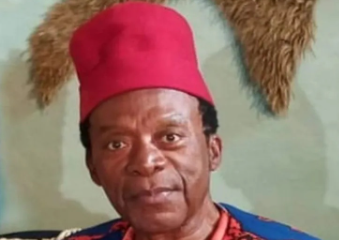
 BIG STORY4 days ago
BIG STORY4 days ago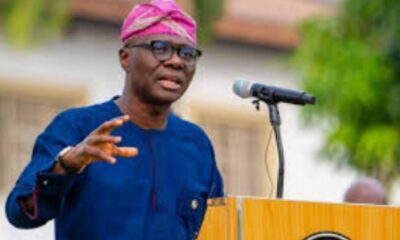
 BIG STORY3 days ago
BIG STORY3 days ago
 BIG STORY4 days ago
BIG STORY4 days ago
 BIG STORY5 days ago
BIG STORY5 days ago
 BIG STORY2 days ago
BIG STORY2 days ago
 BIG STORY5 days ago
BIG STORY5 days ago



